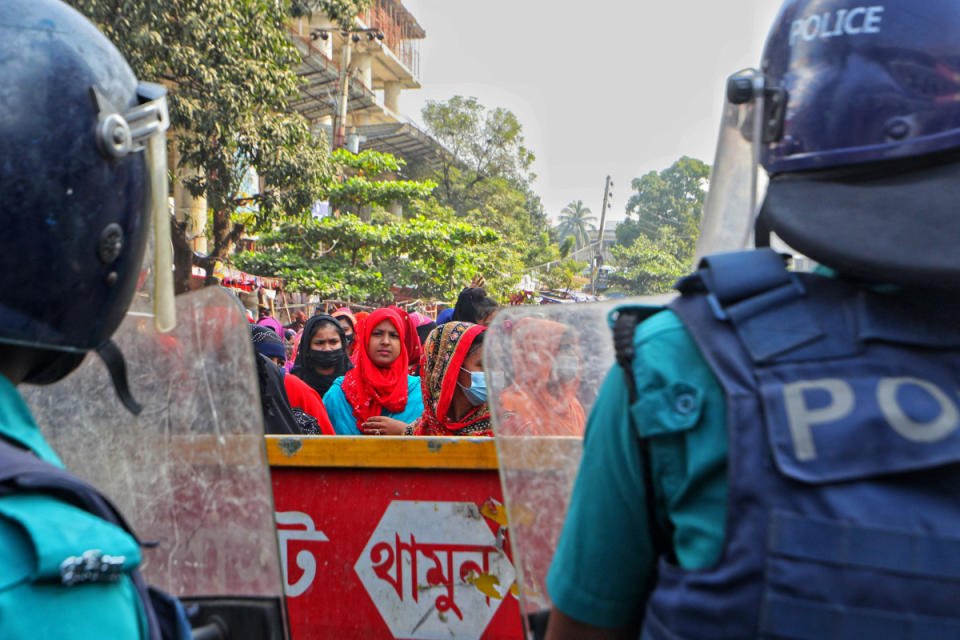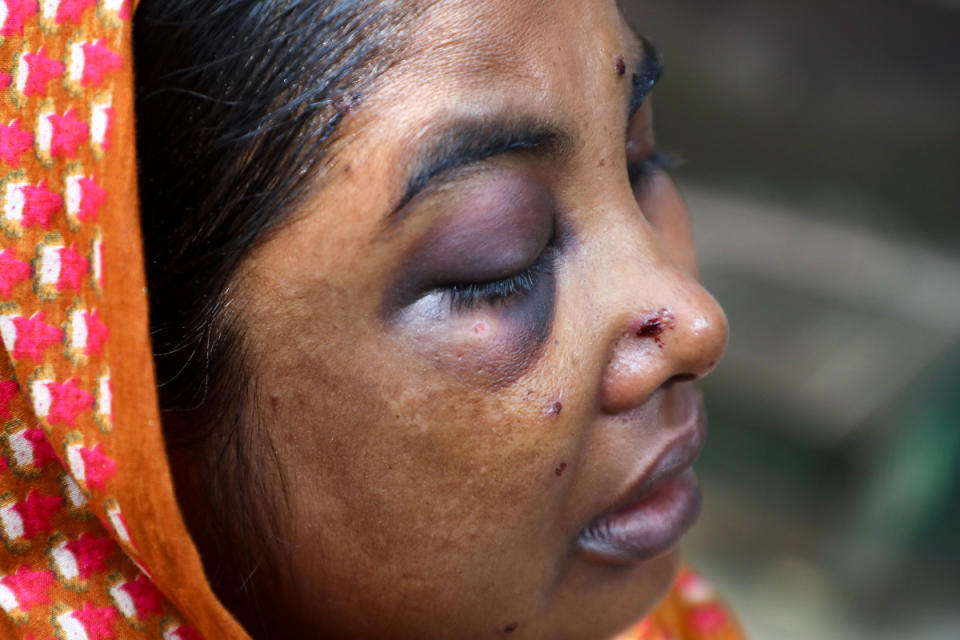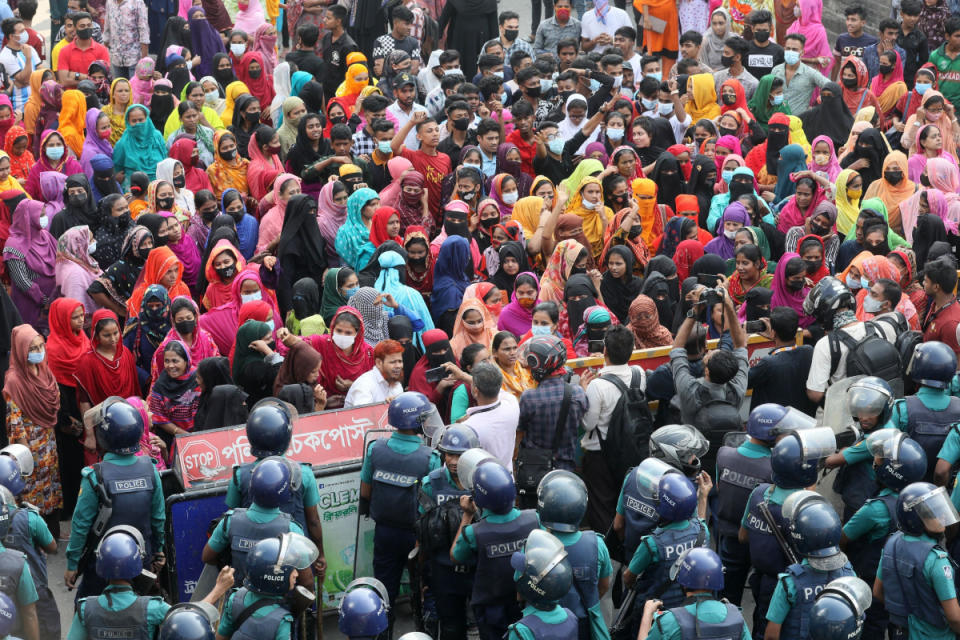In Bangladesh, ‘Unprecedented’ Violence Over ‘Unsustainable’ Wages

A fourth garment worker is dead in Bangladesh amid the South Asian nation’s escalating labor unrest, which has seen tens of thousands of factory employees violently clash with security forces over what they regard as an insufficient increase in the minimum wage.
Local media reported that Jalal Uddin, a 42-year-old supervisor at Islam Garments in Gazipur, died over the weekend after succumbing to injuries from stray bullets during an altercation between demonstrators and police last Wednesday. It was during that same clash that 26-year-old machine operator ??Anjuara Khatun was killed after police reportedly opened fire at a group of protestors. Their deaths add to a toll that includes Md. Rasel Howlader, a 25-year-old Design Express maintenance machinist who was allegedly killed in Gazipur by police late last month, as well as Imran Hossain, a 32-year-old ABM Fashion worker who died after arsonists of unclear affiliation set fire to his factory, also in Gazipur, later that day.
More from Sourcing Journal
Some 130 factories in the hotbeds of Ashulia, Mirpur and Gazipur in and around Dhaka, Bangladesh’s capital and industrial hub, have been closing, reopening and then closing again in response to the growing strife, which began in October as minimum wage negotiations were taking place over the then-floor pay of 8,000 Bangladeshi taka ($72).
Riots erupted on the streets of the world’s No. 2 garment exporter later that month following rumors that the Bangladesh Garment Exporters and Manufacturers Association, or BGMEA, the powerful trade group representing factory owners, would go no higher than 10,400 taka ($94), or less than half of the 23,000 taka ($208) that unions were demanding to keep pace with inflation and the rising cost of living. Still more workers surged into the streets after the government announced earlier this month that the lowest-grade workers would receive a wage of 12,500 taka ($113) beginning Dec. 1.
‘Escalating repression’
“The situation is not good here,” Kalpona Akter, president of the Bangladesh Garment and Industrial Workers Federation and a former child garment worker, told Sourcing Journal, noting that factory managers have filed several dozen criminal charges against their workers for striking or damaging their property. “There is an extreme fear of arrest among workers, neighbors and federation leaders. The police and political brutality is unprecedented.”
Prime Minister Sheikh Hasina’s government is blaming the opposing Bangladesh Nationalist Party, which has been calling for Hasina’s resignation ahead of January’s election, for stoking the hostility. Hasina herself has rejected demands for a higher wage, saying on Friday that protestors should accept the offer or “go back to their village.”
Bogu Gojd?, public outreach coordinator at the Clean Clothes Campaign, the fashion industry’s largest consortium of trade unions and labor nonprofits, is scrambling to keep up with rapidly rising incidents of “escalating repression” against protestors.
“We are receiving reports of security services putting union leaders under tremendous pressure and constant surveillance,” she said. “Several workers have died fighting for their right to a decent wage and yet not a single brand sourcing from Bangladesh has condemned the poverty wage proposed by the government, nor the extreme violence used against the desperate workers.”
But Miran Ali, vice president at the BGMEA and managing director of Bitopi Group and Tarasima Apparels in Dhaka, denied that the situation was getting worse. In a brief voice note on WhatsApp, he said that things were already “cooling down” and “will be perfectly fine” by the end of the week. “The BGMEA is going to be holding a meeting at our offices, hosting all the brands, and we’ll be having a lunch to discuss everything,” he said.
Still, Nazma Akter, founder and president of Sommilito Garments Sramik Federation, an IndustriALL Global Union-affiliated union to which Howlader belonged, sees it differently. While some factory owners have been rationalizing the new wage by telling workers that they can earn more if they take up additional overtime work, they continue to feel angry and helpless. She said that demonstrators are being depicted as criminals, even though “small” rocks and brick chips are no match for rubber bullets and tear gas. Adding to the threatening climate, Akter said, a memo distributed to BGMEA members last week told factories to freeze recruitment until the protests stop.
“Their situation is very strange and very scary,” she said. “This is their life now.”

A ‘one-side narrative‘?
“Workers are desperate to ensure a 23,000 taka wage because they are simply unable to survive on a wage of any less; why else would workers knowingly risk their lives to protest against the wage board’s paltry offering?” said Thulsi Narayanasamy, director of international advocacy at the Worker Rights Consortium (WRC), a Washington, D.C. labor rights group. “This is a David and Goliath battle, with vulnerable workers trying to secure a wage they can live on while the powerful industry punishes them for speaking out against their exploitation. Workers have been attacked with a wrongful application of labor law through the threat of shutting down factories under no work, no pay provisions.”
On Saturday, Faruque Hassan, president of the BGMEA, handed out assistance checks to the families of Howlader, Imran and Khatun in what the Business Standard described as a “ceremony” that emphasized the importance of worker welfare in Bangladesh’s garment sector, whose 3,500 factories and 4.1 million employees contribute 85 percent of the country’s exports, and urged unity between employees and employers for its collective good.
“Each and every garment worker plays a significant role in shaping the success of our readymade garment industry,” the outlet quoted Hassan as saying. “The welfare of our workers is of paramount importance, and we must remain united to uphold their rights and interests.”
In a note to the media this week, Hassan said that the “one-side narrative” against the new wage is “hurting” Bangladesh’s garment industry and economy. The gross wage of an entry worker will soon be 4,500 taka ($41), or 56 percent, higher, he said, “way above” the aggregate inflation of 35 percent since 2019. “But has the impact of this revised minimum wage been analyzed carefully and factored in to balance the other side?” he asked.
According to calculations by the WRC, the updated wage only boasts a real increase of roughly 14 percent.
Hassan said that workers at the 12,500 taka level can take home 17,744 taka ($160) a month if they add two hours of overtime per day and 21,094 taka ($191) with four hours of overtime per day once attendance bonuses, festival bonuses and earned leave are taken into account. He further noted that since Bangladesh’s advantage lies in its workforce, if the wage increase is “not done pragmatically, this will question our global competitiveness.”
Another looming threat
Md. Fazlul Hoque, managing director of Plummy Fashions, a “green” knitwear manufacturer in Narayanganj, just south of Dhaka, agreed that factories will not be able to increase wages “by 100 percent all of a sudden” because “that’s just not possible,” particular as orders from mostly Western brands are down across the industry, creating a financial knock-on effect.
Hoque told Sourcing Journal that even if the H&Ms and Zaras of the world promise to pay more to help support suppliers in meeting the new minimum wage, these high rollers represent only 50 percent of the country’s clientele. Small and medium factories, too, he noted, will be harder-pressed to absorb the extra costs of orders, especially those placed before the new wage was negotiated.
“So I have some doubt that all the factories will be able to pay the wage in the first week of January and a new problem can arise at the moment,” he said. “Maybe I’m wrong. I’d be happy to be proven wrong.”
The problem, Hoque added, is that suppliers have very little bargaining power, whereas buyers can pick and choose who they want to work with, meaning that it’s the “responsibility of the buyers to come forward and offer proactively higher prices.”
Brands “always talk about factory owners’ responsibility toward environment or safety or the livelihood of workers,” he added. “I think this is the right time for them to show their responsibility.”
Sharing the costs across the chain
The few brands that responded to Sourcing Journal’s requests for comment—among them, Adidas, H&M Group, Levi Strauss & Co. and Puma—say that they realize the role responsible purchasing practices play in facilitating fair compensation, even writing letters through their multistakeholder organizations expressing as much. Even so, while Ali previously told Sourcing Journal that a “handful” of brands, including H&M, have privately reached out to suppliers to say they’ll be implementing blanket increases in their prices, none have publicly and explicitly said that they will cough up more.

“What we need is brands to increase prices to support minimum wages that meet the most basic needs of workers,” said Ayesha Barenblat, founder and CEO of fashion advocacy group Remake. She pointed to BGMEA data revealing how the prices that buyers pay for items like T-shirts and trousers have barely budged over the past decade, even though the cost of everything else has gone up.
“So the question for Puma or any brand is to…ask, when you commit to responsible purchasing practices what does this actually mean? Are the prices you pay going to go up? Yes or no. How do you set prices? Do you take into account what workers need given [the] rising cost of goods?” she said.
Barenblat said that brands also need to iterate the importance of freedom of association with Bangladeshi stakeholders during this “uptick of violence.” And, with workers desperate for financial support due to factory closures and mounting medical and legal costs, brands need to take a “lot more action.”
“The situation in Bangladesh is uncertain at the moment and unfortunately workers are bearing the brunt of the violence and the instability,” Shelly Heald Han, chief of staff at the Fair Labor Association, whose members include Adidas, Hugo Boss and Puma, told Sourcing Journal. “The announced minimum wage is, by all calculations, insufficient for workers to live on and needs to be renegotiated. During this time we are asking our members to work closely with their suppliers to make sure workers are safe, continue to get paid, and are not subject to violence or arbitrary legal sanctions.
Actions that brands can take, she said, include reviewing production schedules and adjusting delivery timeframes as needed; ensuring that their costing and purchasing departments are ready when the new minimum wage kicks in next month; and continuing to publicly support wage progress for workers in Bangladesh through union engagement and collective bargaining, regardless of where the minimum wage lands.
Peter McAllister, executive director of the Ethical Trading Initiative (ETI), another multistakeholder group with prominent brand associates, said that he has been in conversation with organizations, members and, indeed, the Bangladesh wage board to try and encourage them to consider a wage amount more in line with workers’ requests.
“We consider that the cost of any wage rises should be shared along the value chain, which means in practice that buyers should accommodate these in their costings and in their final price,” he said. “However, organizations like ETI cannot compel individual companies to do this. We can encourage and support and make the case for absorbing what in real terms is still a very small wage increment, but when it comes down to individual commercial negotiations we do not have sight of these and a number of factors come into play.”
Workers should be able to have their voices heard without fear of intimidation, injury or worse, McAllister added.
A ‘matter of life and death’
There’s still time for brands to get involved, Narayanasamy said, adding that there are now 14 days for the wage board to receive responses.
“The necessary precondition of a wage increase, is international brands indicating that they will not accept a wage of less than 23,000 [taka] for their supply chain workers, and to publicly guarantee their suppliers that they will raise their prices enough to cover this increase,” she said. “The brands have utterly failed to live up to their own human rights commitments as their workers are being killed, terrorized and starved. They have the power and leverage to change this, the only thing lacking appears to be the will to do so.”
How brands respond will be a “clear indication of whether their commitments to rights and fair wages are genuine or not,” she added.
The way Mostafiz Uddin, managing director of Denim Expert, a manufacturer in Chittagong, sees it, there needs to be a transparent mechanism for costing that states the price of labor.

“Last year, the price of a trouser was, for example, $5; this year it’s $6,” he said. “Does this mean buyers are paying more for labor? No, it’s because material costs got high. So how do you make this separate and make sure that buyers are paying more money for the increased wages because there’s no way to measure that?”
The 23,000-taka figure isn’t an overreach, Md. Arifur Rahman, Bangladesh country coordinator at the Asia Floor Wage Alliance, told Sourcing Journal. Through the organization’s research, that sum is exactly what is necessary to ensure the most basic standard of living.
“The current wage structure in Bangladesh’s garment industry is unsustainable,” Rahman said. “Five years after the last increase in 2018, we are at a pivotal point in history where making the decision to increase the monthly minimum wage is a matter of life and death.”